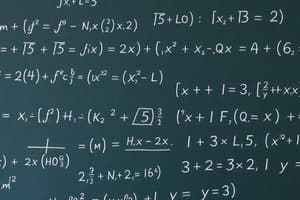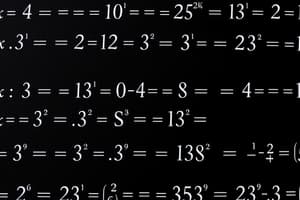Podcast
Questions and Answers
What are the characteristics of the language of Mathematics?
What are the characteristics of the language of Mathematics?
Precise, Concise, Powerful
What is the difference between an expression and a mathematical sentence?
What is the difference between an expression and a mathematical sentence?
An expression does not state a complete thought, while a mathematical sentence does.
What are examples of objects in Mathematics?
What are examples of objects in Mathematics?
Numbers, sets, functions, ordered pairs, matrices, vectors, etc.
What are the roles of equal sign and inequality signs in mathematical sentences?
What are the roles of equal sign and inequality signs in mathematical sentences?
What can mathematical sentences be in terms of their form?
What can mathematical sentences be in terms of their form?
How can we describe the truth of mathematical sentences?
How can we describe the truth of mathematical sentences?
What is the truth value of the statement: 'All perfect squares are even numbers'?
What is the truth value of the statement: 'All perfect squares are even numbers'?
What is the truth value of the statement: 'The sum of all interior angles of an oblique triangle is 180°'?
What is the truth value of the statement: 'The sum of all interior angles of an oblique triangle is 180°'?
In mathematics, an expression is the analogue of which part of an English language sentence?
In mathematics, an expression is the analogue of which part of an English language sentence?
Which of the following is NOT an example of an expression in mathematics?
Which of the following is NOT an example of an expression in mathematics?
In mathematical sentences, what do equal sign and inequality signs represent?
In mathematical sentences, what do equal sign and inequality signs represent?
Which of the following statements is sometimes true and sometimes false?
Which of the following statements is sometimes true and sometimes false?
If x is a natural number, which of the following equations holds true?
If x is a natural number, which of the following equations holds true?
What does the statement 'If x is a positive integer, then x^2 < x' indicate about the relationship between x and x^2?
What does the statement 'If x is a positive integer, then x^2 < x' indicate about the relationship between x and x^2?
Which of the following statements about rational numbers holds true?
Which of the following statements about rational numbers holds true?
What can be inferred about the sum of even numbers based on the statement 'The sum of even numbers is divisible by four'?
What can be inferred about the sum of even numbers based on the statement 'The sum of even numbers is divisible by four'?




